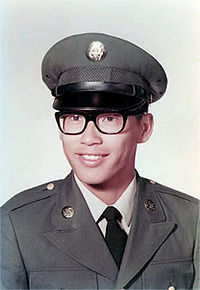Terry Teruo Kawamura
Terry Teruo Kawamura (December 10, 1949 – March 20, 1969) was a United States Army soldier. He was also a recipient of the United States military's highest decoration—the Medal of Honor. He received it for his actions in the Vietnam War.[1]
| Terry Teruo Kawamura | |
|---|---|
 Corporal Terry Kawamura | |
| Born | December 10, 1949 Wahiawā, Hawai'i |
| Died | March 20, 1969 (aged 19) Camp Radcliff, Republic of Vietnam |
| Place of burial | Mililani Memorial Park, Mililani Town, Hawaii |
| Allegiance | United States of America |
| Service/branch | United States Army |
| Years of service | 1968 - 1969 |
| Rank | Corporal |
| Unit | 173rd Engineer Company, 173rd Airborne Brigade |
| Battles/wars | Vietnam War |
| Awards | |
- In this Japanese name, the family name is Kawamura.
Early life
changeKawamura was born at Wahaiwa, Hawaii on the island of Oahu.[2] His grandparents were Japanese immigrant parents. Kawamura was a Sansei, which means that he was a third generation Japanese-American.[3]
Soldier
changeKawamura joined the Army from Oahu in 1968.[4] By March 20, 1969, was serving as a Corporal in the 173rd Engineer Company, 173rd Airborne Brigade. On that day, at Camp Radcliff, Republic of Vietnam, Kawamura smothered an enemy-thrown explosive with his body, sacrificing his life to protect those around him.
Kawamura was 19 when he died. He was buried in Mililani Memorial Park in Mililani Town, Hawaii.
Medal of Honor citation
changeKawamura's Medal of Honor recognized his conduct in frontline fighting in Vietnam in 1969.[1] He smothered the blast of an explosive charge with his body.[5]
The words of Kawamura's citation explain:
For conspicuous gallantry and intrepidity in action at the risk of his life above and beyond the call of duty. Cpl. Kawamura distinguished himself by heroic action while serving as a member of the 173d Engineer Company. An enemy demolition team infiltrated the unit quarters area and opened fire with automatic weapons. Disregarding the intense fire, Cpl. Kawamura ran for his weapon. At that moment, a violent explosion tore a hole in the roof and stunned the occupants of the room. Cpl. Kawamura jumped to his feet, secured his weapon and, as he ran toward the door to return the enemy fire, he observed that another explosive charge had been thrown through the hole in the roof to the floor. He immediately realized that 2 stunned fellow soldiers were in great peril and shouted a warning. Although in a position to escape, Cpl. Kawamura unhesitatingly wheeled around and threw himself on the charge. In completely disregarding his safety, Cpl. Kawamura prevented serious injury or death to several members of his unit. The extraordinary courage and selflessness displayed by Cpl. Kawamura are in the highest traditions of the military service and reflect great credit upon himself, his unit, and the U.S. Army.[1]
Namesake
changeTanouye is the namesake of the Kawamura Gate which connects Wheeler Army Airfield with the city of Mililani. This east gate is named in honor of Kawamura.[6]
Related pages
changeReferences
change- ↑ 1.0 1.1 1.2 US Army Center of Military History (CMH), "Medal of Honor Recipients, Vietnam (A-L)" Archived 2010-11-08 at the Wayback Machine; retrieved 2012-12-31.
- ↑ "Terry Teruo Kawamura" at MilitaryTimes.com Archived 2012-06-05 at the Wayback Machine; retrieved 2012-12-31.
- ↑ Okamoto, Vincent. "Genesis of the Japanese American Viet Nam Memorial," citing the Japanese American Historical Society Journal, 2001; retrieved 2012-12-31.
- ↑ "Kawamura, Terry T. (MOH), CPL" at TogetherWeServed.com; retrieved 2012-12-31.
- ↑ CMH, "Asian Pacific American Medal of Honor recipients" Archived 2009-07-29 at the Wayback Machine; retrieved 2012-12-28.
- ↑ Public Affairs Office, US Army Garrison, Hawaii, "Schofield Gate Chagnes Begin June 30," Archived 2013-02-15 at the Wayback Machine June 26, 2012; retrieved 2012-12-30.